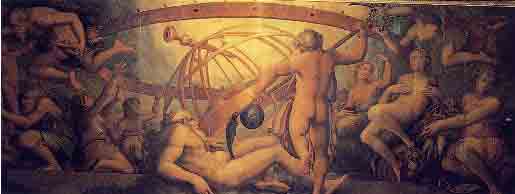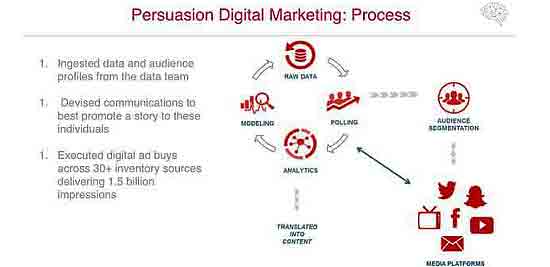
Giorgio Vasari’s The Mutilation of Uranus by Cronus
Mythology is the conveyance of ideology through storytelling. The Old Greeks mastered this technique, and their mythology is the result of perhaps hundreds of thousands of years of evolution. It marks a milestone in darwinistic pressure for the ultimate story and carries all the prejudices and all the glories of humankind. It’s the perfect method of transmitting values and morals in society – it does so much more effectively then historical records or philosophy as it provides a common narrative, which is something much more powerful than facts in shaping opinions. The key to mythology’s success is the ability to merge the history of factuality (the real world) with the history of the individual psyche. Cronus kills his father Uranus at his mother Gaia’s request, in an Oedipal display, for example. Mythology must always merge the evolutionary artifacts from the species it targets with the history it’s telling. This makes the stories appealing on a quintessential level.
After the postmodern era, when the mechanism of art and storytelling were studied and exploited to their maximum, we come to the hypermodern, transmodern or altermodern age – where we must regress to the old methods of transmitting values, but now gifted with all the new tools acquired in the 20 centuries.
If the new discoveries within bio-social determinism (the idea that free agency actually is controlled by our environment and biological influences) hold, then it also holds that the best way to promote changes in society is through mythology. There could then exist a type of mythological determinism – where people’s more structural actions, values and orientations are determined by the type of mythology they are seduced by. Today that mostly takes place through audiovisual content, primarily pumped out by North American film studios. Those characters, their dilemmas and actions teach us how to behave morally and what to desire from life – often worshiping superhuman characters and creating a sense that the individual is the solution for global problems, not collectives. And this kind of social influence manifests on a societal scale.
If a society desires, say, lowering the level of hatred against minorities, how does it proceed? Not by leaving it up to each individual to decide for themselves, but for example through learning programs in schools and advertising campaigns. It also funds art that is aligned with its core ideology (which already exists more or less properly defined by governments – which is a huge task in itself and very little discussed). In doing so they enter the pool of competing values in society and try to nudge things their way. But they go only halfway in recognizing how meaningful and important this process is. They accept that people are influenced by art and culture, but don’t accept that culture shapes our very actions. They see it as a mix, where bio-social determinism is factual, but so is free agency. The direction I propose is simple: accept at last that we are the manifestation of a culture organism, and not the other way around. Accept that this disputing of values in society is not only desirable, but essential to any change. A government that wants to end violence against minorities could then take deeper action on this front – but who do they go to? Who is it that is specializing in how to shape culture in a specific way? Who is standardizing and professionalizing this kind of meddling? No one. This for now happens through emergence, the fruit of short-lived political processes that uses social tampering in order to yield expected results (the Cambridge Analytica phenomena for example).
Leaked internal document from Cambridge Analytica
As long as this chain remains incomplete, the process will be imperfect. Values will be contested, but the core values that spawn certain behaviors will remain unchanged. We must have the courage to disillusion ourselves and accept how determined we are. We must forge mythologies for the future, so that we can change it fast enough. We open the door for the future of ideology, which is an open game of vastly diverse stances of life fending each other off in the ultimate darwinistic game – a game that will decide which ideas are held by which percentage of people and therefore the way civilizations will work. There’s no escape from this, as the idea of unity is laid to waste and the proposition of no-ideology is an ideology itself. Mythological determinism might be a tool that propels evil ideologies , but the hope is that ideologies that are grounded in science and beneficial to our human and ecological needs will win in the long run. It’s possible that in the future, with deep learning, quantum computers and automation, this process of shaping the zeitgeist will be so perfect that it will be mostly run by algorithms and software and future humans will be infused by coding that will shape their stances and beliefs – therefore turning us into superfluid moral beings that will change ideologies many times during a lifetime. And it won’t be bad, it won’t be different than it is today with mass media influence etc. It will simply be standardized and accepted. It might seem profane to us today, just as the world of today would seem profane to an ancient Greek.
by Bruno Decc
